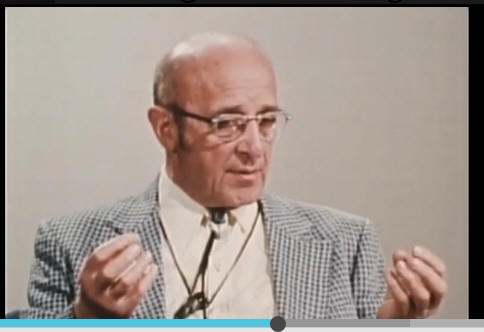|
|
|
The Therapist - overview of his philosophy
Recollections A Celebration of the Life of Carl Rogers
Outline
Three Approaches to Psychotherapy II (1977) Carl Rogers
Carl Rogers and the Client
=====================================
May, Rogers, Satir, and Szasz at The Evolution of Psychotherapy
conference, 1985
Carl Rogers 1/3
- Quest for Peace
Get leaders together to experience group process
(empathy)
then they would take it farther.
West Germany counseling and the effects
Conflict
I'm right, your wrong
I'm good, your bad.
both sides feel the same
your not a person your evil
parties need to get into relationship
Institutions lag behind the people
You're a man, not because you can kill a person, it's
that you can heal a person
Role of Business -
Role of Government - Get leaders together to experience group process
(empathy)
then they would take it farther.
17:00 - Role of education - are very authoritarian
structures - hierarchy
trained to be a conformists
training children on conflict resolution
20:00 - Role of Family - parents that have
learned empathy better results
22:00 - would offer revolutionary changes in education
-
conflict resolution
self directed
technology based on a philosophy
23:40 - the human being is a constructive organism
counter to most religion
counter to Freud
there is a positive core in all people
destructive qualities from social tensions
why are culture use force, intimidation, etc.
role of the leader - to be fighter, aggressive
minor disputes become major with technologies
A conference-workshop report by Carl Rogers
Carl
Rogers - A Peace Init. - Labeled Part II Coronado Press Conf -
A
Person-Centered Approach to World Peace with Carl R. Rogers
Healthy State - Carl Rogers - 1986
Was in South Africa and USSR
21:00 the third day of conference - Suggested they try an
'empathy
experience'.
triads: Client, therapist, observer .
15 minutes the person talks and is reflected., then they discuss it.
then they switch roles..
was very moving, a safe environment and the floodgates opened.
People being the therapists didn't do a good job. people had talked
about empathy but doing it was another matter.
putting active listening into practice is different than talking
about it.
Carl Rogers and
Paul Tillich p.1
on how to use his work in education
start in first grade with choice.
why don't we do more of this?
we don't believe in democracy
we don't trust people
Carl-Rogers-person-centered-therapy
In this historic interview with Carl Rogers filmed two years before he
passed away, the man named the single most influential psychotherapist
of the past quarter-century, the founder of the person-centered
approach, reflects on his major contributions and explores his
provocative opinions on a wide range of topics including therapy,
education, and social change.
Carl Rogers on Marriage: Persons as Partners
Carl Rogers speaking at UCLA 4/3/1967
He talks about empathy in education at around 33 min.
|
|
||||






